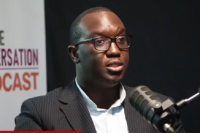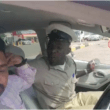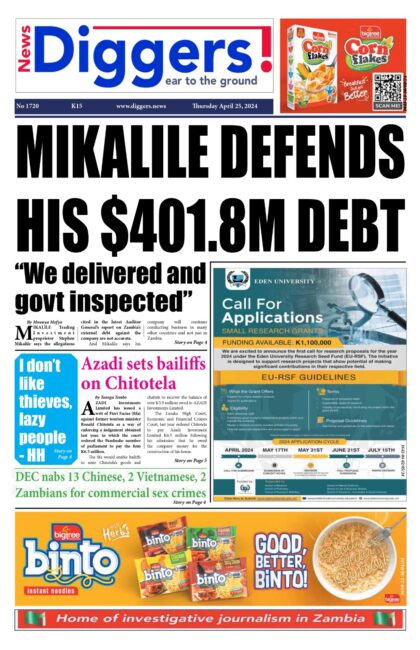The Transparency International Zambia 2017 Bribe Payers Index survey reports that the Traffic Police department has maintained its slot as the most corrupt government wing.
We are sure that even the traffic police officers themselves can agree to this survey and say “correct mwami, ndife tuziba kusecha bantu”.
In fact, our police officers have turned motorists into slaves of traffic rules. These rules are no longer there to provide road safety for the road users; rather they are there to provide extra income for the underpaid officers.
We have traffic rules in this country that prohibit you from touching your cell phone while driving. Whether you were merely cutting an incoming call so that you listen to news on your car stereo or you were checking time on the cell phone, they will charge you. Yet if they see you drinking Coca-Cola while driving they won’t take issue. Which one is more dangerous?
The one who inspects traffic on the road always has a very serious, no nonsense face; taking the traffic offence you have committed so personal, almost making you believe that they truly care about your road safety.
But the ‘undertaker’ who sits in the back seat of the unregistered Toyota Corolla parked by the roadside is the one who puts things into perspective for you to understand what they really care about. They will give you an option that will make you feel obliged to pay a bribe while suggesting that they don’t want it.
The trick is to avoid traffic offenders queuing up so that there are no witnesses to the revenue collection process. So, clearance must be fast. This officer will start by softening the mood, as the motorist may have been angered by the rudeness of the Constable who stopped you.
“Iyo nikulipila K350. Ndimwe mukamba ati we are corrupt, so tupaseni chabe,” Bwana ‘Njombe’ will pre-empt his motive while picking his teeth, as if to say he has already eaten and doesn’t need your bribe.
If it’s a speeding charge, he will then ask you where you were rushing to, in a manner that suggests that he is also concerned that you are delaying further. In the end, the motorists hastily leave the ‘tithe’ and the case is closed.
The saddest police department is that one which is responsible for issuing police reports for lost or stolen documents. You can even see the veins in the dealing officer’s head threatening to pop out when you say that you need to replace a lost passport.
Previously, this was a petty cash collection point for our men and women in uniform, but now, the new payment system requires that such money be deposited directly into a government bank account before the police can issue a receipt. They hate this with a passion and if they had a workers union, there was going to be a serious police protest against this move.
With that frustrating measure in place, the next available opportunity to syphon from the victim of stolen property is a fake promise to recover the items. This is not corruption; it’s called initiative, since a service will be offered.
“Ushe munalibeko nangu phone muchola? That is the first question they will ask. If you make the ‘mistake’ of saying there was a phone among the stolen items, even if you explain that you don’t have a serial number for it and that there was no SIM card, they will make you believe that using that unconnected cell phone, they can still trace the thief and recover your items.
But there is always one condition. “We need transport. We need to go to Zamtel, Airtel and MTN bla bla bla…”
On this one, they even become emotional as if it is their phone that has been stolen. This is because whatever money you pay for their mobility to conduct the Mission Impossible is not receipted anywhere and is definitely non-refundable.
Sadly, the fortunate few who manage to recover their stolen items using this method end up losing nonetheless, because the apprehended culprit will instead reimburse the arresting officer and the CIO for the ‘sweat’ before being released on indefinite police bond.
But we must never lose sight of the fact that our police officers remain the most corrupt of all public servants because these people also claim the largest direct interface with the public. Therefore, fighting corruption in the police service should start with us, the victims.
Sometimes, we, the public members, contribute so much to this corruption index among police officers. We say so because we do not believe that every man and woman in the service in corrupt. There are some officers who have a genuine passion for their work and they have no intention of engaging in corruption.
But there are instances when, after getting professional help from an officer, this victim with a corruption mentality goes ahead to fork out a few hundreds ati ‘muguleko lunch, bwana.’ How can the officer refuse? Money has no allergies.












